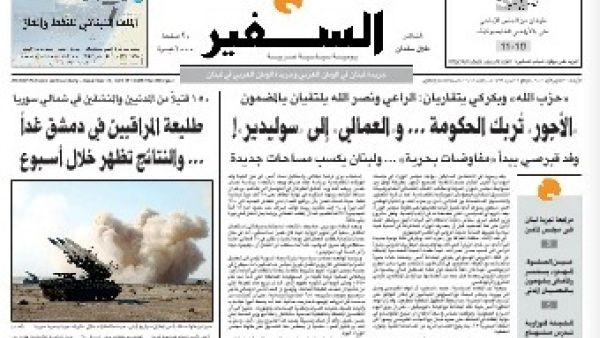Three days ahead of the announced closure of As-Safir newspaper, publisher and editor-in-chief Talal Salman said it would continue, but told The Daily Star that he remained skeptical about the paper’s future and the industry in general. Less than a week after announcing that the company would cease operations at the end of March due to financial difficulties, Salman informed his employees that the paper would in fact not halt operations as planned.
“We aren’t very optimistic; I guess it’s for an interim period,” Salman told The Daily Star when asked how long it would keep publishing and how the paper would reassess the situation. “I don’t imagine anything will change. I don’t think we will have a state or a responsible authority like there are in [other] countries around the world.”
Globally, many print newspapers are experiencing a turbulent period. This weekend saw the Independent, a long-established British newspaper, go to the newsstands for the last time as it moved to an online-only platform. Salman highlighted that challenges in shifting from print to digital media was one of the reasons behind the issues in the industry.
“All newspapers in Lebanon are suffering from a dangerous crisis ... because the costs are much higher than the revenues,” he said.
Many readers are now taking their news online – often free to read, paid for through advertising. However, there’s been a decline in advertising revenue both online and in print, which has left newsrooms with larger expenses than they can earn in sales.
Nevertheless, Salman added that things could be done to help mitigate the consequences of this shift, if there was a reliable local authority to manage it. Salman also denied reports of staff cuts, saying: “Either we all stay or we all leave. There isn’t anyone who was fired from As-Safir, either today or yesterday.”
The paper’s recent decision to close sent shockwaves through the country. It led supporters to rally behind the prominent newspaper, which has a strong legacy behind it. According to last week’s announcement, the paper’s English, Arabic and French online sections were also planned to close.
Salman established the paper in March 1974 at the height of the pan-Arab movement. It gained followers among the region’s intelligentsia following the October 1973 war between Israel, Syria and Egypt. Many lauded the paper as a beacon of resistance, as it gave “voice to the voiceless” and aligned itself with resistance movements across the Arab world. Today, the editorial stance leans toward supporting Hezbollah and Syria’s ruling party.
A source in the newsroom told The Daily Star how Salman announced the news that the paper would continue to the approximately 140 staff members.
“On Sunday, Talal Salman phoned employees to inform them, or told those he saw in person, that he had backed down from his decision and will continue to publish, but didn’t say until when,” the source said. Salman, the sources added, will meet with all employees Tuesday to personally update them on the situation.
Salman said that the people were what made him change his mind, even if only for a while.
“There was hype. A lot of people – more than you can imagine – called and visited [saying] that this is a newspaper that we cherish, that takes care of our issues and [amplifies] our voices,” he said. As Lebanon suffers from presidential vacuum, a paralyzed Parliament and relatively inactive Cabinet, the newspaper’s supporters told Salman that they saw it as an outlet for the people. “It’s true that this is affectionate talk, but it is also political,” he said. “And we found that we can bear, for a period, and will keep working as long as we can. God will help.”
However, Salman said the newspaper hadn’t received any additional financial support. He added that they were looking for other partners but haven’t found anyone.
“Journalism is no longer appealing for investors. Journalism in Lebanon doesn’t have a future.”








